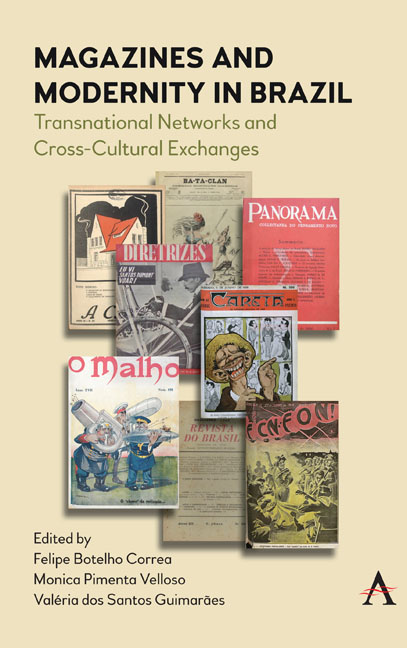Book contents
- Frontmatter
- Contents
- List of Figures
- List of Contributors
- Introduction
- Chapter 1 The French Periodical Print Culture In Brazil: A Survey of Catalogues and Mediators (1800–1945)
- Chapter 2 The Transnational Model of Popular Illustrated Magazines: Three Case Studies from Brazil (1900–20)
- Chapter 3 The Transnational Networks of the Modernist Periodical Print Culture: The Magazine Lumière in the Aftermath of WWI
- Chapter 4 Versions of Modernity in the Household Magazine A Casa (1923– 45)
- Chapter 5 Panorama Magazine and the Far-Right in Brazil (1936–37)
- Chapter 6 Against Nazi-Fascism in Brazil: The Case of the Magazine Diretrizes (1938–44)
- Chapter 7 Literary Inquiries and Disputes on Global Modernism: the Debate in Brazil During WWII
- Chapter 8 Modernity and Modernisms in the Magazine Sombra (1940–60)
- Index
Chapter 8 - Modernity and Modernisms in the Magazine Sombra (1940–60)
Published online by Cambridge University Press: 04 February 2022
- Frontmatter
- Contents
- List of Figures
- List of Contributors
- Introduction
- Chapter 1 The French Periodical Print Culture In Brazil: A Survey of Catalogues and Mediators (1800–1945)
- Chapter 2 The Transnational Model of Popular Illustrated Magazines: Three Case Studies from Brazil (1900–20)
- Chapter 3 The Transnational Networks of the Modernist Periodical Print Culture: The Magazine Lumière in the Aftermath of WWI
- Chapter 4 Versions of Modernity in the Household Magazine A Casa (1923– 45)
- Chapter 5 Panorama Magazine and the Far-Right in Brazil (1936–37)
- Chapter 6 Against Nazi-Fascism in Brazil: The Case of the Magazine Diretrizes (1938–44)
- Chapter 7 Literary Inquiries and Disputes on Global Modernism: the Debate in Brazil During WWII
- Chapter 8 Modernity and Modernisms in the Magazine Sombra (1940–60)
- Index
Summary
In the context of the rapid modernization of Brazil throughout the 1940s and 50s, the luxury magazine Sombra can be seen as a ‘handbook of good manners’, teaching and regulating the practices and representations of the upper classes from Rio de Janeiro and São Paulo. On the other hand, the magazine stands out at a moment in which the market of publications was expanding: a greater number of newspapers, magazines and books starts to circulate, and advertising is streamlined with the arrival of multinational advertising agencies in the country. In this national periodical print culture, the magazine Sombra connected the great Brazilian metropolises (‘modern constellations’, according to Flusser) to the ‘archaic islands’ of the underdeveloped parts of Brazil.
Sombra emerged as a guide to the new ways of thinking and living of the social groups that ascended to the elites between 1930 and 1960. Above all, these elites headquartered in the cities of São Paulo for its economic power, and Rio de Janeiro, for being the political capital that gathered the prominent figures of the governments of Getúlio Vargas and Juscelino Kubitschek. Although heterogeneous and polyform, this group of intellectuals, artists, architects, civil servants and politicians gathered around those with similar aesthetic, tastes and social perceptions that separated them from the middle and working classes, suggesting a strong differentiation based on class and race. The magazine displayed the daily life of the Carioca and Paulista elite members in texts accompanied by photographic images taken at parties, bars, nightclubs, restaurants, parties and other diverse social events, often defining who belonged to the upper classes. In this sense, the magazine operated as a mechanism of an identity marker in the ways of thinking and seeing the world that circulated among these elites.
Using a refined language and diction, the magazine reported the social, political and cultural project of the elites, creating visual narratives that attempted to define modern Brazil from their elitist perspective. Aligned with the images established by the modernist artists who emerged in 1920s in São Paulo, the contents of Sombra were often associated with the historical roots of the nation, its traditions, its popular art, its religious syncretism, its folklore, its cultural diversity and its racial miscegenation.
- Type
- Chapter
- Information
- Magazines and Modernity in BrazilTransnational Networks and Cross-Cultural Exchanges, pp. 155 - 168Publisher: Anthem PressPrint publication year: 2020



